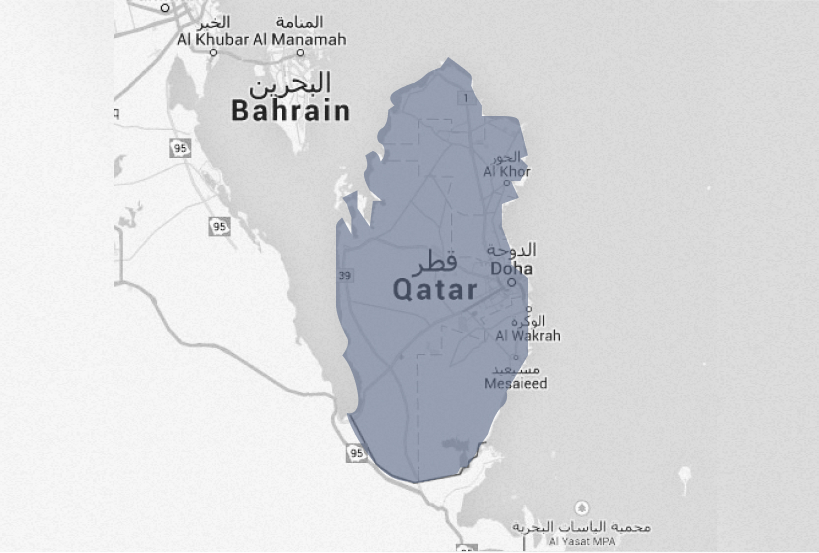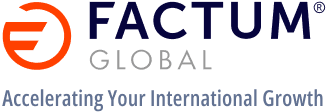Market Spotlight:
QATAR

Factum Scale:
-
With one of the highest gross domestic product (GDP) per capita in the world, Qatar, through its National Vision 2030 Plan, seeks to establish strategic partnerships overseas and offers ample opportunities for foreign businesses.
-
Through its Public-Private Partnership law and the foreign investment 100% law, Qatar continues to attract significant foreign direct investment and innovation, specifically in the education, environmental technologies, and healthcare sectors.
-
With a large endowment of hydrocarbon, Qatar has established a sovereign wealth fund to mitigate the effects of the infamous “Dutch Disease” and remains committed to investing in non-hydrocarbon, knowledge-based sectors to reduce economic dependence on oil and gas.
-
Qatar ranks 77 out of 190 countries on the World Bank’s Ease of Doing Business report and continues to improve, with recent reforms including providing easier access to credit and enabling an efficient business registration process by reducing red tape and the duration from 45 to 20 days.
Tariffs & Regulations
Factum Scale:
-
Qatar imposes a 5% ad valorem tariff on the cost, insurance, and freight (C.I.F.) invoice value of most imported goods. Tariffs on alcoholic beverages, tobacco products, and pork are levied at 100%.
-
Since 2003, Qatar has been part of the Gulf Cooperation Council (GCC) Customs Union with neighboring Bahrain, Kuwait, Oman, Saudi Arabia, and the United Arab Emirates, and shares the same import duties and free trade arrangements. Qatar supports regional integration having signed bilateral investment treaties with 61 countries and is a member of the GCC.
-
Although there isn’t an existing, bilateral investment treaty with the United States, the two nations have strong commercial, political, and security-related ties.
Fluency in English
Factum Scale:
-
The Education First English Procificeny Index classifies Qatar as ‘low’ in English proficiency, though 3rd most proficient in the Middle East.
-
The official and most widely spoken language in Qatar is Arabic however, English is the main language used at multinational companies in Qatar and the language used when communicating with global partners. English is often visible, along with Arabic, in advertisements, menus, and other public signage.
-
The government aims to increase English proficiency by designating it the “second official language,” widely used given a large expat population from India, the Philippines, Nepal, and Egypt.
-
Government agencies typically use both Arabic and English when publishing paperwork, press releases, and websites.
-
Qatar has become an attractive destination for sporting events, hosting the FIFA World Cup in 2022 and global conferences (e.g., 2023 United Nations Conference on the Least Developed Countries) expanding familiarity with English among Qatari’s.
Society, Culture, and Business Etiquette
Factum Scale:
-
Qatar’s culture remains traditional and conservative with influences from its Beduoin heritage and Wahhabi Islam. It is predominantly a muslim country with Islam (Wahhabi Sunni Islam) as the official religion and it operates under Sharia law.
-
There is a significant societal divide between Qatari’s and migrant workers. Qatari’s enjoy high living standards with good access to healthcare, education, and housing, while migrants experience much lower standards of living.
-
Qatar is often criticized for migrant labor exploitation, discrimination against women and LGBTI groups, repression of freedom of expression, and unwillingness to fight the climate crisis. Be mindful and sensitive when discussing these issues with your Qatari counterparts.
-
Learning basic Arabic (i.e., greetings or numbers) is one way to begin building relationships with your counterparts.
-
Be prepared and print your business cards printed in Arabic and English, and be sure to consult with a native Arabic speaker to confirm translation accuracy.
-
Meetings in Qatar typically take longer than the time allotted and frequent interruptions should be anticipated during meetings. Be sure to leave plenty of time between meetings to account for delays.
-
Be mindful of dress code, especially at religious sites, where conservative attire and avoiding skin exposure is essential. Avoid public displays of affection, conversations involving religion or politics. Use proper titles (Mr. or Sheikh, Ms. or Sheikha) and respect to Ramadan (fasting/prayer) etiquette.
Economic Stability
Factum Scale:
-
Qatar is ranked the 36th freest economy of 177 countries recorded, and 3rd of 14 countries in the Middle East/North Africa region.
-
Qatar’s high GDP per capita, low unemployment rate (1% in 2022), large foreign reserves, gross GDP savings rate of 50%, and low debt levels have all contributed to a stable economy.
-
A major concern for Qatar’s economy is the overreliance on the hydrocarbon sector. Oil and gas industries have contributed to more than 80% of the government’s total revenue since 2014 and account for 90% of Qatar’s total exports.
-
Qatar is a small nation on the Arabian peninsula bordering Saudi Arabia in the south and the Gulf of Bahrain to the West and the Persian Gulf to the East. Due to its geographical location on the Arabian peninsula, Qatar has significantly benefited from international trade and foreign investment.
Labor
Factum Scale:
-
Qatar has a labor force participation rate of 88%, surpassing the global average of 59%. The Qatari labor force has a mix of highly-skilled (61%) and low-skilled labor, according to the 2020 Qatari Planning and Statistics Authority Labor Force Survey.
-
Highly-skilled workers have recently increased given strategic government investment in education and specialized training, increasing demand in skilled sectors, and attraction of multinational companies.
-
Labor remains very affordable for foreign investors, with a minimum wage of QAR1,800/month (USD$494/month), making Qatar an attractive hiring environment.
-
The labor force (skilled and unskilled) is migrant-dependent with 94% from Bangladesh, India, Nepal, and the Philippines.
-
Qatar, and many other neighboring Gulf states, operate under the Kafala “sponsorship” System. Workers are required to be sponsored, typically by their employer, giving the employer control over the workers’ visa, work permit, and ability to exit the country. While Qatar claims to have abolished the kafala system in 2019, critics say reforms are poorly enforced and the system is still widely used.
-
Of note, Qatar continues to receive global condemnation over labor issues. The Human Rights Watch and Amnesty International have identified low wages, long work days, unsafe conditions, migrant discrimination, and human trafficking as major concerns. While workers are optimistic of recent governmental reforms, significant labor issues remain which may force foreign investors to take pause rather than be subjected to reputational or brand risk.
Business Structures
Factum Scale:
-
The Limited Liability Company (LLC) is one of the most common business structures for foreign investors. An LLC must (a) have at least 51% of shares held by a Qatari citizen or company, (b) minimum capital of QAR200,000, and (c) minimum of 2, maximum of 50 shareholders.
-
However, the Qatar Financial Center (QFC), a free-trade zone in Doha, has its own regulatory environment in which 100% foreign ownership is allowed.
Notable Institutions
Factum Scale:
-
US-Qatar Business Council is a Washington, DC-based membership organization for US companies seeking business growth opportunities, networking, and curated match-making in Qatar.
-
Qatar Ministry of Commerce and Industry (MoCI) is the most important institution when setting up operations in Qatar. The MoCI is tasked with issuing import & export licenses, registering businesses, and acts as the regulation enforcement office. This institution is vital to operations within Qatar.
-
Qatar Chamber of Commerce and Industry (QCCI) is the agency responsible for promoting trade and investment between Qatar and other countries. The QCCI is a vital institution to use for information on trade & business licenses and regulations.
-
Qatar Financial Center (QFC) is a free-zone district located in Doha with its own legal, regulatory, and tax requirements, making it attractive to foreign companies. The QFC may be helpful while setting up your operations in Qatar and offer access to tax benefits. The QFC is a good place to start for new market entrants.
-
Qatar Investment Authority (QIA) may be a source of local business partnerships for foreign investors in Qatar. The QIA is a sovereign wealth fund responsible for investing the country’s wealth and can greatly help guide business investment decisions within the country.
-
Qatar Central Bank (QCB) oversees monetary policy and financial institutions. To learn more about the country’s financial status and regulations, visit the QCB website.
Business Landscape
Factum Scale:
-
The legacy oil and gas sector continues to thrive in Qatar. Government-owned enterprises, particularly those involving energy, are vital to the economy. Qatar is the world’s 2nd largest exporter of liquefied natural gas (LNG), has the 3rd largest natural gas reserves, and is the 6th largest natural gas producer.
-
In recent years, multinational companies have flocked to Qatar due to its investment incentives, particularly in energy and financial services.
-
The private sector in Qatar consists mainly of small & medium enterprises (SMEs), representing 97% of registered private companies and total 15-17% of non-oil GDP in 2022. To be considered an SME in Qatar, a company must have less than 250 employees and revenues below QAR100million (USD$27,464,990.00).
-
Family-owned conglomerates make up a significant portion of the Qatari economy. Al Faisal Holding, Power International Holding, Alfardan Group, Almana Group, Jaidah Group, Abu Issa Holding, and Al Muftah Group are all ranked in the Top 100 of Forbes’ Top 100 Arab Family Businesses and are owned and operated by families across the real estate, hospitality, trade, construction, and other sectors.
-
Startups and tech companies, supported mainly by Qatar Development Bank funding, non-Qatari owned firms, and Islamic Financial Institutions (e.g., Qatar Islamic Bank and Masraf Al Rayan) round out the business landscape.


